“When this is all over I’m going to found an association called ‘The Knights of the Idiotic Table’ and its purpose will be to arrange an annual dinner where we tell stories about Lisbeth Salander. You’re all members.” – Stieg Larsson
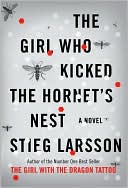 |
The Girl Who Kicked the Hornet’s Nest, by Stieg Larsson The third and final volume of Stieg Larsson’s Millenium series, breathlessly waited for and then read in two sessions, breaking only for sleep. Was it worth it? Oh yeah. But damn, it’s hard knowing there’s no more Lisbeth Salander after this. It’s rumored that Larsson left part of a fourth manuscript with his girlfriend. No doubt someone will milk the cash cow some day, but it’ll necessarily be finished by other writers and will probably be a pale echo of the three finished works. Unless, of course, it turns out Larsson didn’t write the first three, or at least didn’t write them by himself — which is another rumor. The entire story of the novels’ creation is so strange, so nearly unbelievable — Larsson, who had published only short journalistic pieces before, delivered three finished manuscripts to a publisher and then dropped dead — that rumors are inevitable, and one just knows there is much more to the story than has so far been unearthed. But enough of that. How about The Girl Who Kicked the Hornet’s Nest? Is it as good as the first two novels? Does it finish the story? Yes to both. This one starts slowly, as Larsson reacquaints you with all that has gone before, especially all the crazy things that happened in the second novel. But a couple of chapters in, you’re caught up and the action starts again. The action in this volume is a bit more subdued than in the first two volumes. In the first two books, Salander and Blomkvist are out in the world, tracking people down, hackng into computers, getting shot at. In this book, the police and prosecutors assume a greater role as the whole bloody mess comes closer to a nation-shaking trial. But Salander’s enemies are busy behind the scenes, and they introduce some shocking violence of their own. I mentioned, back in my review of the first book, The Girl with the Dragon Tattoo, that I thought the Swedish-to-English translation was a little clunky, but at the same time thought that was part of the charm, and expressed the hope that they’d use the same translator for the second and third books. I think they did, and I think I was right — there’s a foreign feel to some of the narration, and little Swedish touches throughout. I particularly liked it when various characters would disappear for two weeks to a month, as they went on vacation or sick leave. Remember when we Americans had jobs like that? Sigh. . . . This is in no way great literature. The three novels are potboilers, nothing more. But damn, they do grab you and pull you in, and if you read them you’ll understand their incredible popularity. But do yourself a favor and read them in order, one, two, three. |
 |
War, by Sebastian Junger Sebastian Junger and a cameraman spent a year, off and on, embedded with a single Army platoon at a series of mountain outposts in the Korengal Valley near the Afghanistan/Pakistan border, an area where American troops are under almost constant attack from the Taliban. I knew Junger’s work from earlier books (The Perfect Storm, A Death in Belmont, and Fire) so I knew approximately what I was going to get: a near total immersion in manliness, stripped to its most elemental form. And War delivers, in spades. This isn’t a book about why we’re in Afghanistan. It’s a book about troops under fire and the comradeship, pride, understated heroism, and excitement that results. Junger writes with an immediacy and descriptive power that puts you right in the middle of the action; not many authors have this level of skill. When it comes to troops in contact, Junger makes you understand what’s going on. If you’re going to read any of the many political books about our war in Afghanistan, you should read this book as a companion piece. |
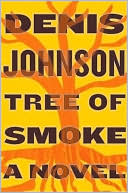 |
Tree of Smoke, by Denis Johnson An excellent novel about American imperialism, corruption, and Vietnam. A new and not-very-wise CIA employee falls under the spell of his war-hero uncle, a legendary CIA agent gone rogue, and gets swept up in betrayal and counter-betrayal, gradually losing his values and beliefs, in a chilling echo of the way America betrayed itself in Vietnam and lost its own values and beliefs. Structured around the lives of a few main characters — the young CIA agent;the rogue colonel and his Phillipino, Vietnamese, and American sidekicks; a Canadian widow and aid worker; two brothers from Phoenix, Arizona, one of whom becomes a tunnel rat in Vietnam; a turncoat member of the Viet Cong — Tree of Smoke covers the arc of the Vietnam war and its aftermath, and how its almost infinite series of betrayals corroded both Americans and Vietnamese. Along the way I sensed echoes of The Quiet American, Apocalypse Now, even Moby Dick. I was moved by the power and immediacy of Denis Johnson’s writing. It’s a damn good book and I could not put it down. I haven’t thought of Vietnam in years, but I’m thinking of it now. Vietnam betrayed us all; Tree of Smoke brings it all back and stands as a warning against the similar round of betrayal and counter-betrayal we’re involved in today in the Middle East and Afghanistan. |
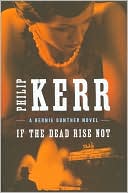 |
If the Dead Rise Not, by Philip Kerr I heard about this, the latest Bernie Gunther mystery, on NPR. The author, Philip Kerr, has a great hook: Bernie’s a German, investigating crimes in Berlin during the rise of the Nazi Party. I immediately thought of the great novels of Alan Furst and Martin Cruz Smith. When Alan Furst’s characters set out to spy on, frustrate, and impede the Germans during the 1930s and 40s, or when Martin Cruz Smith’s Arkady Renko gets involved in a politically sensitive criminal investigation in Moscow during the 1960s, the era is very much part of the story, and history comes alive along with the characters on the page. When Philip Kerr’s Bernie Gunther uncovers high-level Nazi Party and American mob collusion during the bidding for the 1936 Berlin Olympics, the historical backdrop is just that, a backdrop, and the presence of several infamous Nazi bigwigs is mere name-dropping. Bernie’s your classic hard-bitten ex-cop detective, a flatfoot who enjoys good food, strong drink, Havana cigars, and gorgeous dames, all of which he enjoys repeatedly and without much reflection. He could be American, English, or French, and he could just as well be plying his trade in some other historical era. The novel is a detective story; the history is incidental. But I would have given all that a pass and might even have read another Bernie Gunther novel some day, had it not been for the final chapter, where, to my shock and dismay, Philip Kerr tied up all the loose plot lines by having Bernie and Noreen, his main squeeze, explain it all in a conversation: “Then he did that, so I shot him and hid the gun in a laundry basket, then planted some false evidence to make it look like some guy you haven’t heard about until right this instance did it.” “Oh really? What happened then, Bernie?” A professional novelist wrote this shit? Sorry, that’s just lame. I will not go sleuthing with Bernie Gunther again. |
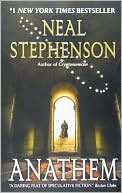 |
Anathem, by Neal Stephenson It’s been years since I’ve read a science fiction epic of this scope, one that creates an entire cosmology from the ground up. Stephenson has vision — a complex vision, though, one that requires much explanation, and I’ll fault Stephenson as a writer for overindulging himself in its explication, most often with long, tedious passages of dialog between the philosophical clock-winders of the concent (yes, there’s also an extensive new vocabulary to learn). Even though Stephenson’s vision is complex, it is comprehensible to anyone well-read in science fiction, and he could have written a tighter book by cutting back on his characters’ academic discussions. Still. It was fascinating to see his world unfold, and there was plenty of space-opera action to keep me entertained. Honestly, I didn’t know anyone was still writing science fiction like this — not since Asimov died. If you’re serious about sci-fi, this one needs to be in your library. |
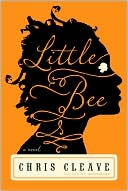 |
Little Bee, by Chris Cleave This is a very fast read. Of course, it has a great hook, one that really pulls you in, and that helps — you keep turning pages to find out just what happened to bring this young Nigerian girl together with the 30-something English couple, and believe me, the details are both upsetting and thought-provoking. Chris Cleave switches point of view from chapter to chapter, Little Bee alternating with Sarah, and at least in the first few chapters, Little Bee is a fresh voice, compelling and believable. In later chapters, his 16-year-old refugee becomes wise beyond her years, and, frankly, less compellingly interesting. I don’t want to spoil anything, but LIttle Bee has a horrific story to tell — think of Eggars’ What Is the What? — and she has a young girl’s perspective on the horrors that she (and her family, and her village) has endured: I will not soon forget the way she phrases it: “and then the men come.” But as I mentioned, in later chapters she becomes almost indistinguishable from Sarah, and you lose the feeling that the horrors are being retold by a young girl, the very thing that made those horrors so immediate. I felt somewhat let down at the end. |